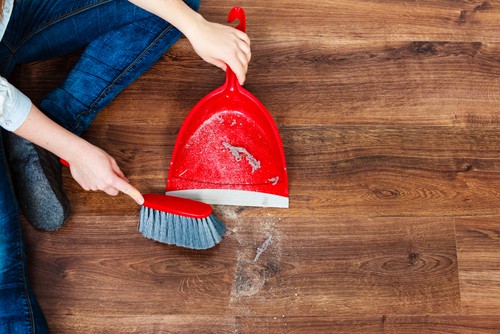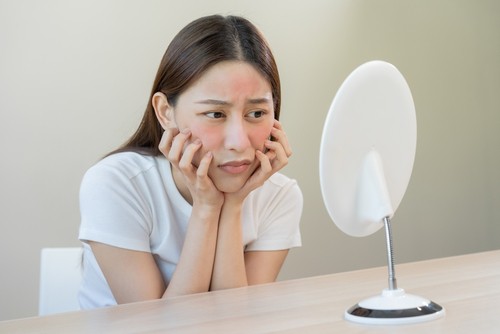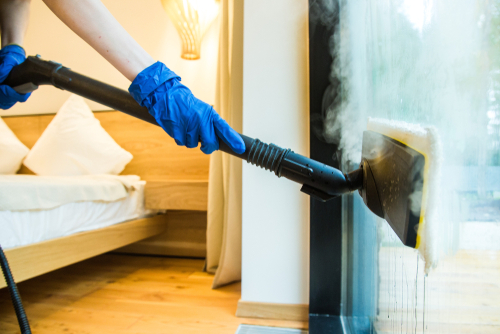
Tips On Window Cleaning
April 8, 2022
Can Cleaning Service Eliminate Germs?
May 30, 2022How Dust At Home Affects Our Body?

How Dust At Home Affects Our Body? Dust is present in most of our homes. It is a combination of organic and non-organic matter. It settles into the different nooks and corners of our home and gets accumulated over time. The best way to eliminate dust from the house is to vacuum clean it. However, some precautions need to be taken while doing so.
Some dust might contain toxic material. This article will discuss how dust at home affects our bodies. Read on!
Table of Contents
ToggleAsthma Attacks

Dust is a significant cause of asthma attacks. It can irritate the lung and aggravate asthma symptoms. It is especially hazardous to children, who breathe through their mouths – directly into the lungs – when they have a cold. The dust mite feces are leading allergens that can cause asthma attacks. The home dusts mites can live in your bedding, carpets, soft furniture, toys, and stuffed animals.
They like warm and humid areas. An excellent way to reduce their numbers at home is to vacuum clean frequently with a vacuum cleaner with allergy relief features.
Allergies

Allergies are a common problem for many households. The typical symptoms may include sneezing, runny nose, itchy eyes or skin, watery eyes, and congestion. These symptoms can be highly uncomfortable, especially when they last over a long period. To reduce the impact of allergies in your home, you must first determine what is causing them.
Dust is among the top causes of allergies in homes, making it essential to reduce the amount of dust in your surroundings. If you suffer from allergies while at home and want to reduce their impact on your life, try using air filters such as dust busters that can help remove dust from your home.
Fever

Dust mites cause fever. Dust mites are microscopic creatures that live in house dust and feed on skin cells. These skin cells contain a protein called keratin. Dust mites break down keratin into harmless substances called peptides. People with asthma develop symptoms when they breathe in peptides from dust mites. The most common symptoms are wheezing, coughing, and difficulty breathing.
It is also important to note that the air quality in your home may be affected if you have a lot of dust floating around in the air. This is because the germs contained within the dust particles will eventually land on surfaces such as walls or furniture, where they may spread more quickly than if they were floating around freely in open spaces like rooms.
Headache and Dizziness

When there is dust in the air, it can irritate our sinuses, and when this happens, we might feel pressure in our head that can trigger headaches. The presence of dust at home is also associated with dizziness, especially when an individual is allergic to this dust.
If you are experiencing any of these symptoms, you should check your home for the presence of dust in it. Air purifiers equipped with HEPA filters can help you remove the dust in your house.
Ear Infection

Ear infections can occur due to exposure to home dust. These are common conditions that affect adults and children alike. They happen when there is fluid buildup in the ear. This fluid becomes a breeding ground for bacteria and viruses, which leads to infection.
The symptoms of ear infections include dizziness, a feeling of fullness in the ear, hearing loss, pain in the ear, fever, and drainage from the ear. The treatment involves taking medications such as antibiotics and antihistamines. There is no known cure for an ear infection; however, it can be prevented by keeping your ears dry.
Respiratory Problems

Various other health problems are associated with home dust. One of them is respiratory problems. The dust particles present in your home can cause numerous respiratory problems.
These include asthma attacks, cough and wheezing, lung diseases, and other breathing problems. The dust particles don’t have any odor or color, so you may not even realize they are there. But they certainly affect the air quality around you, so it is essential to remove the dust from your home.
Skin Irritation

Skin irritation is one of the home dust of most common ways that affect our body. A person with sensitive skin may experience inflammation when exposed to dust particles. The symptoms of this condition include rashes, hives, and dryness. People who have severe skin conditions such as eczema or psoriasis may experience flare-ups due to dust exposure.
People with chronic sinusitis are also prone to experiencing skin irritation because their condition causes them to breathe through their mouths instead of their noses which dries out lips over time. This makes them more susceptible than others who do not have chronic sinusitis problems at home, like dryness on lips due to dry air conditions around us all day long every day.
Fatal for Infants and Children

Dust at home may seem harmless, but it can negatively affect our bodies. These dust are not only the ones we see with our naked eyes but also those that are smaller than what you can see. Some of the dust we see and breathe in includes dander, dust mites, pollen, and fabric fibers. These things are usually found in carpets, pillows, covers, couches, and other furniture.
Infants and children are more prone to this dust because they spend most of their time playing on the floor or on the carpet where these allergens are present. They crawl on their hands and knees the same way as their toys do, which makes them absorb more home dust from carpet floors than adults do.
Eye Infection and Diseases

Dust at home is one of the significant causes of eye irritation and infection. Home dust can also cause eye diseases like cataracts, glaucoma, macular degeneration, and dry eye. Dust particles can be very irritating to our eyes. The dust particles get caught in the mucous membranes of our eyes, causing redness, itching, and watery eyes.
Dust contains mold spores and fungi that are very dangerous to our health. Inhaling these particles can cause allergic reactions and other health problems. If you are suffering from any of these problems, you should immediately consult your doctor or an eye doctor for proper treatment. Most people suffering from any eye problem will try to avoid dust at all costs because they do not want their eyes to suffer from further damage.
How Dust At Home Affects Our Body? – Wrapping Up
There are different kinds of dust around our homes, which can harm our health. They pose a danger to our health due to the chemicals involved when making them and the particles in the air. The best way is to vacuum at least once a week and keep your surroundings clean from dust.



